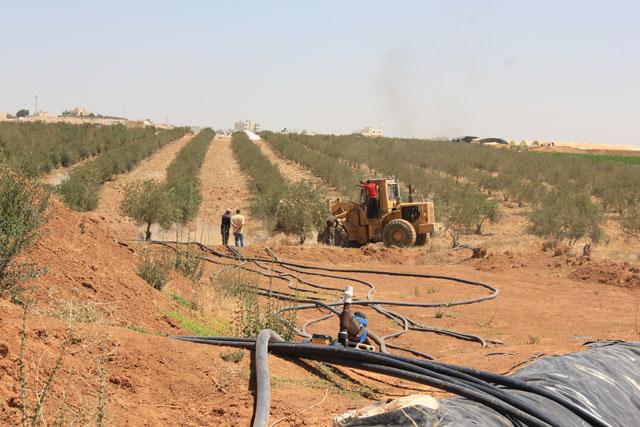You are here
Farmers should seal illegal agricultural wells by year end — Water Ministry
By Hana Namrouqa - Jul 09,2014 - Last updated at Jul 09,2014
AMMAN — Owners of illegal agricultural wells are required to start procedures for sealing their wells by the end of this year, a government official said on Wednesday.
The Water Authority of Jordan (WAJ) will start sealing all illegal agricultural wells across the Kingdom by the end of this year, when a grace period given to farmers by the Cabinet in November 2013 ends, Water Ministry Spokesperson Omar Salameh said.
“The Cabinet endorsed a decision last year allowing farmers using water to irrigate their crops from illegal wells to continue cultivation until the end of 2014," Salameh added.
"Now that the grace period is about to end, we remind farmers using illegal agricultural wells to prepare for sealing them by the end of this year,” he told The Jordan Times.
The ministry instructed farmers who dug illegal wells to irrigate their crops to coordinate with WAJ for the procedures to seal the wells, Salameh said.
“Owners of illegal agricultural wells are mainly requested not to prepare their lands for Orweh Tashrineyeh cultivations, because the wells will be sealed at the end of this year, thus they will incur losses if they don’t abide by the instructions and the Cabinet decision.”
Orweh tishrineyeh is a local agricultural term that refers to winter crops planted at the end of each year, when farmers grow vegetables in the Jordan Valley. Different kinds of vegetables are cultivated during this period, including cucumber, tomato, aubergines and zucchini.
“The Cabinet decision seeks to end all violations on water resources and protect underground water from further depletion and rising salinity levels,” Salameh noted.
There are over 1,500 illegal agricultural wells across Jordan, the majority of which are found in the Jordan Valley, according to official figures.
The Cabinet decision, which allowed owners of illegal agricultural wells to continue pumping water for irrigation, stipulated that they pay for it and stop cultivating crops that depend on the illegal wells by the end of this year.
In March, WAJ started issuing notifications to owners of illegal agricultural wells, demanding that they pay their fines, which exceed JD24 million.
The notifications detail the name of the debtor and the required cost, which is either estimated according to the terrain of the agricultural unit, the type of crops, the energy consumed, satellite images, or according to the readings of the water gauges, according to the Water Ministry.
If owners of the illegal agricultural wells fail to pay their dues by August 15, authorities will seize their movable and immovable assets and take other legal measures, which also include a travel ban.
The ministry said that owners of illegal wells pay 150 fils per cubic metre for the first 10,000 cubic metres pumped, while the price rises to 250 fils for 10,000-30,000 cubic metres and 500 fils for over 30,000 cubic metres.
Related Articles
The Water Authority of Jordan (WAJ) has started issuing notifications to owners of illegal agricultural wells, demanding that they pay their dues, which exceed JD24 million, officials said on Tuesday.
The Ministry of Water and Irrigation has reached an agreement with tribal leaders in Al Lubban in Madaba Governorate to seal illegal wells in the area, a government official said on Saturday.
Seventy per cent of water loss in Jordan is due to theft and illegal usage, according to the Ministry of Water and Irrigation.


















